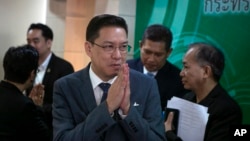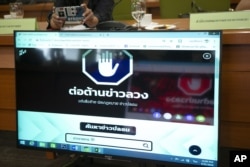Thailand plans to set up a center to fight the spread of fake news on social media and the internet. Government officials have said they expect the center to open by next month.
Thai rights groups and opposition parties are concerned. They fear that officials may use the new center to target and silence government critics.
In elections this past March, voters returned to power the military leaders who seized power in 2014. After the vote, Thailand’s armed forces arrested hundreds of people for critizing the military and protesting the ouster of the civilian government. Some of the criticism appeared on website or social media.
Thailand’s Digital Economy and Society Minister announced plans for the center two months ago. The country is among several Southeast Asian nations taking steps against online fake news.
The state-operated National News Bureau of Thailand later reported that the center would open by November 1. Its job is to examine fake news stories found online and react to any untruthful reports that could endanger peace and security.
The center will have its own website and work with the messaging software application Line. The news bureau said the center would deal mainly with issues like natural disasters, the economy and finance, health products and government policy.
However, opposition parties and rights groups say the history of the military rulers and the government that has replaced them provide reason to worry.
Sunai Phasuk is a researcher working in Thailand for the rights group Human Rights Watch. She told VOA “there are serious concerns that the…fake news center of the government will be yet another tool for censorship.”
People working for Thailand’s digital economy and society minister told VOA that no one was available to comment for this story.
Government critics are worried that the center will have the power to arrest people or take legal action against them.
The digital economy minister "has made it clear that the center will…[be] authorized to prosecute people with various laws," Sunai said.
Arthit Suriyawongkul is a co-founder of the Thai Netizen Network, which speaks up for freedom of speech online. He is also worried about the planned center.
Arthit said that Thai officials have too often called critical opinion "fake news.”
He added, "We found that the effort...is actually targeted [at] those [who are] anti-government.”
Thailand is not alone.
Lasse Schuldt is with the law department at Thailand's Thammasat University. He said that Southeast Asia has become a test ground for laws against “fake news.”
Malaysia and Singapore have gotten the most attention for recent legislation that bans “fake news.” But Schuldt noted that other countries in the area have their own laws governing fake news.
In Thailand, the Computer Crimes Act makes it a crime to share false information online. Vietnam and Indonesia have similar ‘fake news” centers.
I’m Jonathan Evans.
VOA’s Zsombor Peter reported this story. Susan Shand adapted it for VOA Learning English. George Grow was the editor.
_______________________________________________
Words in This Story
fake – adj. something that is not real; a copy or reproduction; claiming to be something that one is not
online – adj. connected to or controlled by a computer or a computer network
censorship – n. the suppression of news reports, books or films that are considered a threat to security
prosecute – v. to take legal action against someone or something
Write to us in the Comments Section or on our Facebook page.






